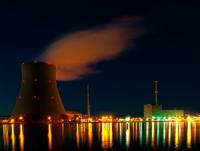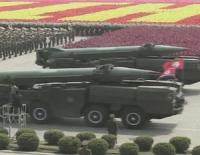-
Balloon-borne infrasound sensor array detects explosions
Infrasound is sound of very low frequencies, below 20 hertz, which is lower than humans can hear. African elephants produce infrasound for long-distance communication at around 15 hertz. For comparison, a bumblebee’s buzz is typically 150 hertz and humans hear in the range of 20 to 20,000 hertz. Infrasound is important because it’s one of the verification technologies the U.S. and the international community use to monitor explosions, including those caused by nuclear tests. Traditionally, infrasound is detected by ground-based sensor arrays, which don’t cover the open ocean and can be muddled by other noises, such as the wind. Sandia Lab scientists is using sheets of plastic, packing tape, some string, a little charcoal dust, and a white shoebox-size box to build a solar-powered hot air balloon for detecting infrasound.
-
-
FAA declares seven nuclear research facilities no-drone zones
The Federal Aviation Administration (FAA) has granted a request from the Department of Energy (DOE) to declare seven DOE’s nuclear research facilities no-drone zones. Starting 29 December, drone operators would not be allowed to fly their UAVs within 400 feet of these facilities: The FAA said it is currently considering more “no-drone zone” requests from federal agencies.
-
-
Computer modeling aids solder reliability in nuclear weapons
Solder isn’t the first thing that comes to mind as essential to a nuclear weapon. But since weapons contain hundreds of thousands of solder joints, each potentially a point of failure, Sandia National Laboratories has developed and refined computer models to predict their performance and reliability.
-
-
Obama administration ended program targeting Hezbollah drug smuggling to secure nuke deal with Iran
The Obama administration obstructed a campaign by the U.S. Drug Enforcement Administration (DEA) to monitor and prosecute Iranian-backed terrorist group Hezbollah, in order to solidify the 2015 nuclear accord with the Islamic Republic, according to a news report. The campaign, called Project Cassandra, launched in 2008, was aimed at disrupting Hezbollah’s weapons and drug trafficking practices, which included smuggling cocaine into the United States. Over the years, the Lebanese-based terror organization had morphed from a Middle East-focused military and political group into an international crime syndicate.
-
-
Newly declassified videos of nuclear tests
Researchers at Lawrence Livermore National Laboratory (LLNL) released sixty-two newly declassified videos today of atmospheric nuclear tests films that have never before been seen by the public. The videos are the second batch of scientific test films to be published on the LLNL YouTube channel this year, and the team plans to publish the remaining videos of tests conducted by LLNL as they are scanned and approved for public release.
-
-
DHS establishes the Countering Weapons of Mass Destruction office
Secretary of Homeland Security Kirstjen Nielsen last week announced the establishment of the Department of Homeland Security’s (DHS) Countering Weapons of Mass Destruction (CWMD) Office. DHS says that the CWMD Office will elevate and streamline DHS efforts to prevent terrorists and other national security threat actors from using harmful agents, such as chemical, biological, radiological, and nuclear material and devices to harm Americans and U.S. interests.
-
-
U.S. medical profession unprepared for nuclear attack: Study
Escalating tensions between Washington and Pyongyang over North Korea’s nuclear program have fueled concerns about the possibility of nuclear warfare, and a new study has found that American medical professionals are woefully unprepared to handle the needs of patients after a nuclear attack. “I was not surprised that the responses from the emergency medical community were relatively poor in terms of knowledge and attitudes, because that’s what you get with radiation-myths versus reality,” said the study’s lead author.
-
-
Middle Eastern countries pushed U.S. to attack Iran’s nuclear facilities: Kerry
Former Secretary of State John Kerry on Tuesday said that that he Israel, Egypt, Saudi Arabia were pushing the United States to bomb Iran’s nuclear facilities rather than join other powers in signing the 2015 deal. Speaking at a Washington, D.C. forum, Kerry said he believed that Egypt and Saudi Arabia – and other Middle Eastern countries agitating for a U.S. military strike against Iran – would have publicly criticized the United States if it went ahead and attacked Iran.
-
-
If Trump wants nuclear war, virtually no one can stop him
The general in charge of America’s nuclear arsenal, John Hyten, recently said he would resist carrying out an illegal order from the president to use those weapons. His comments echoed the ones made a few days earlier by one of his predecessors, retired Air Force Gen. Robert Kehler. While the generals are no doubt military men of integrity, my four decades of experience as a diplomat and scholar of American foreign policy suggest there is no law that would make a presidential order to launch a preemptive nuclear strike on North Korea illegal. The bottom line is that a nuclear war won’t be prevented by military officers refusing to obey an order they consider illegal. And such a situation won’t be avoided by congressional action. The legislative branch is paralyzed by partisan politics. Using the bomb is up to the discretion of a president who came to office with no experience in the military, government or foreign affairs beyond real estate deals in other countries. And after ten months of on-the-job training, he seems no better prepared for such a responsibility.
-
-
Why nuclear deterrence could work on North Korea
The same logic that kept a nuclear war from breaking out between the United States and former Soviet Union is the best strategy to now pursue with North Korea, several scholars said last week at Stanford. The discussion revolved around whether North Korea will have the ability to strike the U.S. with nuclear warheads, and can the U.S. depend on a deterrence strategy like it did during the Cold War? Deterrence theory holds that nuclear weapons are intended to deter other states from attacking with their nuclear weapons, through the promise of retaliation and possibly mutually assured destruction.
-
-
Nuclear energy programs do not increase likelihood of nuclear weapons proliferation: Study

Contrary to popular thought, nuclear proliferation is not more likely to occur among countries with nuclear energy programs, according to new research. In a historical analysis of the relationship between nuclear energy programs and proliferation from 1954 to 2000, the study finds that the link between the two has been overstated. “The findings suggest that international efforts to manage the proliferation risks of nuclear energy programs have been quite effective,” says the study’s author. “Even when countries become more technically capable of developing nuclear weapons due to an energy program, they can often be restrained by timely intelligence and the prospect of sanctions.”
-
-
200 killed in tunnel collapse at North Korea nuclear test site
About 200 North Korean laborers and engineers have been killed after a mine shaft being dug at the country’s nuclear test site collapsed in early September. On 3 September, North Korea conducted a nuclear test of a bomb with a yield of about 280 kilotons (the Hiroshima and Nagasaki bombs were in the 12-15 kiloton range). Experts say that the powerful test, conducted in a neighboring tunnel, may have weakened the wall- and ceiling-support scaffolding of the tunnel which collapsed. North Korea has conducted all its nuclear tests in a tunnel network under Mount Mantap. South Korean and Chinese scientists have warned that the mountain may be suffering from “Tired mountain syndrome,” and that more tests may cause the mountain to collapse, releasing large amounts of radioactive fallout.
-
-
“North Korea crisis could spark a global chain of nuclear strikes”: Luxembourg Forum

Leading international experts on nuclear non-proliferation and world leaders met Monday in Paris for the International Luxembourg Forum on Preventing Nuclear Catastrophe to express their concern on the escalating crisis in nuclear weapons control. During his opening remarks, Tony Blair warned that “the proliferation of nuclear weapons is the most serious threat today to the fate of humankind.” Blair further said that “Proliferation begets further proliferation leading to risk of additional terrorist capability.”
-
-
Detecting nuclear materials used in dirty bombs
Radiological material falling into the wrong hands is a constant security concern for governments around the world. Border agencies must scan incoming vehicles and freight for radioactive material, which is a challenging task, as huge volumes of both move across borders each day. Imperial College London’s physicists have developed two devices for detecting nuclear materials.
-
-
Waltzing toward a two-front global war
Military analysts argue that the sine qua non of a superpower is the ability to fight two major campaigns in different regions of the globe nearly simultaneously. Critics of the George W. Bush and Barack Obama administrations said that reduced defense investment and a decade of counterinsurgency campaigns had left the U.S. military unprepared to do so. Still, Christopher Bolan writes in Defense One, the United States finds itself one step away from war on the Korean Peninsula and perhaps two from military confrontation with Iran, “dancing an uncertain waltz in which a misstep would be catastrophic.”
-
- All
- Regional
- Water
- Biometrics
- Borders/Immig
- Business
- Cybersecurity
- Detection
- Disasters
- Government
- Infrastructure
- International
- Public health
- Public Safety
- Communication interoperabillity
- Emergency services
- Emergency medical services
- Fire
- First response
- IEDs
- Law Enforcement
- Law Enforcement Technology
- Military technology
- Nonlethal weapons
- Nuclear weapons
- Personal protection equipment
- Police
- Notification /alert systems
- Situational awareness
- Weapons systems
- Sci-Tech
- Sector Reports
- Surveillance
- Transportation
Advertising & Marketing: advertise@newswirepubs.com
Editorial: editor@newswirepubs.com
General: info@newswirepubs.com
2010-2011 © News Wire Publications, LLC News Wire Publications, LLC
220 Old Country Road | Suite 200 | Mineola | New York | 11501
Permissions and Policies
Editorial: editor@newswirepubs.com
General: info@newswirepubs.com
2010-2011 © News Wire Publications, LLC News Wire Publications, LLC
220 Old Country Road | Suite 200 | Mineola | New York | 11501
Permissions and Policies
